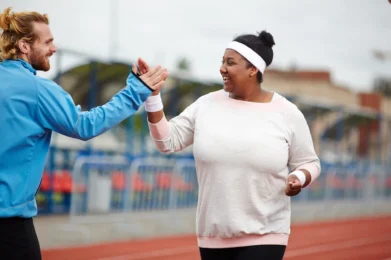In This Article:
- When speaking to children of any age about the coronavirus, remain calm and honest. It helps to address the fact that something is wrong without instilling unnecessary fear.
- Speak to your child in a tone suitable to their age. For example, you wouldn’t talk to your 5-year-old like you would a teenager, and vice versa. Realize that each age group perceives information differently.
- Remember that kids look to us to see how they should react to the pandemic. If they are old enough, they may look to social media as well. Modeling appropriate behavior and limiting screen time is important.
News about the coronavirus is everywhere, from the front pages to the teen chat rooms and the kids’ playrooms. Many parents are understandably concerned, and might be sharing those worries with their children. How do you talk about COVID-19 with kids without making them more scared and anxious?
First off, don’t pretend that nothing’s awry in the world. Kids at all ages know that life has changed pretty dramatically. They’re not going to classes, they’re not seeing their friends and they can’t hug their grandparents.
Different ages deserve different approaches, but one thing is constant: Children need to know that the people around them are there to help and protect them, and that we’re all working together as a team to be safe and healthy.
The challenge is to strike a balance between addressing their concerns and answering questions without fueling anxiety and fear. Not talking about something that is so greatly affecting their daily lives can make kids worry more. On the other hand, providing too much information may cause extra worry.
Before you sit down to talk with you kids, check out reliable sources such as the Centers for Disease Control and Prevention, which has a page devoted to talking to kids about coronavirus. The World Health Organization’s myth busters page can help you prepare for any surprising questions and can provide facts to debunk any misinformation that children may see on the internet.
It’s also important that your approach be developmentally appropriate:
- Kids 5 and younger are too young to grasp the serious nature of the outbreak, so too much information is more harmful than helpful. Instead, try to keep a calm attitude, as our kids look to us to see how they should react to the changes going on in their lives. It is helpful to provide basic information about things such as proper hand washing in order to keep everyone healthy.
- Ages 5 to 10 are more open to information and explanation. They need to be reassured that the changes in their lives are time-limited and put in place to keep everyone healthy, so they don’t worry about any doomsday scenarios. Ask your child what they’ve heard about the outbreak and how they are feeling during this time. Be prepared to answer questions in a calm and reassuring manner. It’s ok if you can’t answer everything; being available is what counts.
- Tweens and teens have the potential to become more deeply worried because they may have access to misinformation through social media and from their friends. They also may be resistant to stay home when they feel perfectly healthy. The most important thing with teens is not to lecture, but to have an open dialogue. Ask your teen what they’ve heard about the outbreak, how they are feeling during this time, and if they have any questions. Again, it is ok if you don’t know the answers to all their questions. You may even turn it into a learning experience and try working together as a team to find the answers to some of their questions on reliable websites, such as cdc.gov.
With any age, it’s important be calm and reassuring. If you’re feeling anxious or panicked, it’s probably not the best time to approach your kids because they’ll pick up on your fears.
It’s also important to stick to routines because predictability is important for children. Write daily schedules on a white board, and keep days structured with mealtimes and bedtimes.
Finally, it’s important for adults, teens and young children to limit exposure to TV and other media platforms. Overexposure to the news and chatter about the outbreak can fuel anxiety and panic. When the adults in the house decide to watch the news, watch it after the kids’ bedtime or before the kids get up for the day.
Remember, our kids look to us to see how they should react to the pandemic. Modeling appropriate behavior is important in any situation.You can show your children that everyone is working hard to manage the virus, and that everyone can play an important role by modeling and practicing healthy habits. Your kids will see that, as humans, we take care of each other and help each other, especially through the tough times.






